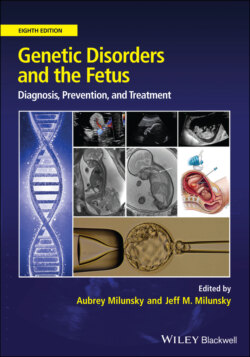Читать книгу Genetic Disorders and the Fetus - Группа авторов - Страница 19
The goal and purpose of prenatal diagnosis
ОглавлениеThe fundamental philosophy of prenatal genetic diagnosis is to provide reassurance to couples at risk so that they may selectively have unaffected children even if their procreative risk for having offspring with a genetic disorder is unacceptably high.167 The goal is to reduce the risk of an adverse outcome to pregnancy and to secure the health of mother and fetus. Both the American Society for Reproductive Medicine and the American College of Obstetricians and Gynecologists recommend preconception counseling several times during a woman's reproductive lifespan.168 Fetal defects serious enough to warrant parental election of abortion are generally found in less than 5 percent of all cases studied, based on current indications for prenatal diagnosis. When couples are at risk for having a child with a serious or fatal disorder, common experience shows that those with risks between 10 and 25 percent or even greater most often avoid pregnancies unless prenatal diagnosis is available. The advent of prenatal diagnosis has made it possible for such high‐risk couples to have children that they would otherwise never have conceived. As a consequence, the number of children born because of prenatal diagnosis is much higher than the very small number of pregnancies terminated because of the detection of grave fetal defects. Prenatal genetic studies are used in Western society virtually exclusively for the detection of defects generally characterized by irreparable intellectual disability and/or irremediable serious to fatal genetic disease. Sadly, at present, the ideal goal of prevention or treatment, rather than abortion after prenatal detection of a fetal defect, is achieved only rarely, with the exception of NTDs. Preimplantation genetic testing (see Chapter 2) does, however, provide an important option that avoids abortion.
All couples or individuals concerned about the risks of genetic disorders in their offspring should seek genetic counseling before conceiving. For the more common indications for prenatal diagnosis (such as recognized carriers, a positive result on a noninvasive prenatal test [see Chapters 6–8] or advanced maternal age), the well‐informed obstetrician should be able to provide the necessary information.169, 170 However, a salutary observation in one study revealed that 43.3 percent of patients referred for amniocentesis exclusively for advanced maternal age had additional mostly unrecognized genetic risks, or significant concerns regarding one or more genetic or congenital disorders.171 Neither a questionnaire in the physician's office nor limited consultation time is likely to reveal many of these disorders. It is now vital that patients understand the importance of determining the name of a genetic disorder in the near or extended family. Since at least 6,739 monogenic phenotypes now have known genes,2 prenatal diagnosis or preimplantation genetic testing is available for avoidance or prevention.
